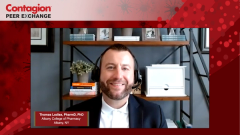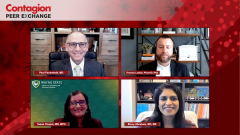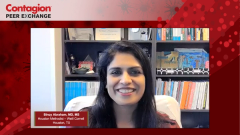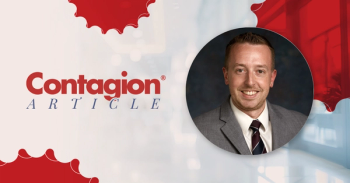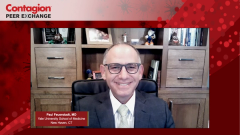
Advice for Physicians to Manage C. Difficile Infection (CDI)
Experts share advice for physicians taking care of patients with C. difficile infection (CDI).
Episodes in this series

Paul Feuerstadt, MD: If you could give one piece of advice to physicians caring for patients with C. difficile infection or recurrent C. difficile infection, Teena, what would that be?
Teena Chopra, MD, MPH: For me, the big one is the follow-up of these patients with recurrent C. diff. We need to keep a close eye on these patients, because they can be really high risk for high morbidity and mortality given that some of them can be no compromised all the patients and recurrence can really take them downhill. We should be following up with them, giving them a good contact number, so they can reach out. While on therapy, are they taking their medications, or do they have access to their medications? It’s so important. A lot of times we prescribe them fidaxomicin, they are not able to fill it, and they are suffering from recurrence. For me, that is the most important thing.
Paul Feuerstadt, MD: Bincy, what are your thoughts about the most important thing for management of either initial or recurrent C. difficile?
Bincy Abraham, MD, MS: I will keep it simple to summarize everything. My main advice is to act early. Early for the diagnosis, and you have the suspicion. Once you know that, you start them on treatment, and assess them early after treatment to make sure they’re responding, so you don’t need to make adjustments immediately after that.
Paul Feuerstadt, MD: Tom?
Thomas Lodise, PharmD, PhD: Paul, I know you’re asking about recurrent C. diff, but I must start with the good antibiotic stewardship. Only use antibiotics particularly in your high-risk patients. Having said that, we treat patients, and we talk to all about the emotional, physical, and all the different sequelae that’s associated with this disease. Unlike other domains and infectious diseases, we have drugs with superiority data. We need to be more aggressive. I think you did a good job highlighting the changes in the microbiota over time, particularly those with recurrent disease. For prompt treatment, I’m a very big advocate of fidaxomicin. I think we should be thinking about bezlotoxumab a bit earlier in the course. Then when we have these live biotherapeutics, and we have to prioritize their use. Again, there’s always issues, which is the right one to use. As more data become available, there will probably be certain circumstances where one may be preferred than the other. But the wait and see approach with this disease; you got a patient in front of you, number seated a 3 to 5 to 10, I’m unaware of this in any other domain. The data are compelling. We’re beginning to appreciate the underlying pathophysiology. Everything we’re doing makes sense. I think this is something that patients suffer with, and we actually have more options to reduce and extinguish that suffering. When I think about CDI [C. difficile infection], people need to think about that patient and all the sequelae otherwise, and really take a very proactive approach in terms of prioritizing somebody’s new treatments.
Paul Feuerstadt, MD: We’ve had really important points here. We have treating earlier from Bincy. We have access from Teena. We have Tom, aggressive, which is appropriate. Not in the negative way, but aggressive treatment upfront to try to shut this down. What I’ll say is accurate or indicated treatments, phasing out metronidazole, considering fidaxomicin, considering bezlotoxumab, considering live biotherapeutic products, if and when they get approved, fecal transplant as it is now, so that these patients don’t go through all that suffering that they have gone through, going through recurrence after recurrence after occurrence. Now during this presentation, we’ve covered a lot of information. We spoke about the mechanics of C. difficile, when to refer patients with C. difficile, differential diagnoses, important educational initiatives. We spoke about a subset of patients with inflammatory bowel disease in C. diff that are kind of a special unique element and a unique group that we need to consider differently. We shifted gears. We spoke about the mechanisms of treatment of C. difficile, antimicrobials treating the vegetative phase, the microbiota eradicating the spore phase. We updated ourselves on the IDSA/SHEA [Infectious Diseases Society of America/Society for Healthcare Epidemiology of America guidelines from 2021. We then shifted gears, spoke about bezlotoxumab, fecal transplant, microbiota based live biotherapeutic products, the trials, the differences. And here we are, at the end of this presentation. I want to thank you for watching this HCPLive® Contagion® Peer Exchange. If you enjoy the content, please subscribe to the e-newsletters to receive upcoming peer exchanges and other great content right in your inbox. Thank you so much for all the panelists for being here tonight. It was such a pleasure working with you.
Transcript edited for clarity
Newsletter
Stay ahead of emerging infectious disease threats with expert insights and breaking research. Subscribe now to get updates delivered straight to your inbox.

